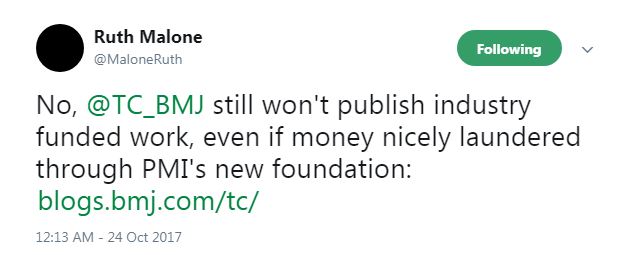Ideology Beats Science

It seems that the shrieking from tobacco control about the Smoke-Free Foundation is still going. I am not particularly surprised by the near-constant wailing. It has, however, taken on a particularly curious note with the activist magazine Tobacco Control now flat refusing to publish any “industry-funded” papers; something it’s refused to do since 2013.
Again, not particularly surprising. But it does highlight a very interesting, and potentially damaging viewpoint.

Let’s be brutally honest here, the funding received by many tobacco controllers is via taxes. Guess where the vast majority of that tax money comes from? Yep, the punitive taxes on tobacco. So, using Ruth’s logic, tobacco control work is nicely laundered by the Government.
One rule eh?
Tobacco Control has a normative focus: we strive to publish the best research that informs and advances public health and policy.
You will, of course, remember that this exact “journal” insists on having ‘debate’ in its rapid response system, and only in that system. As I wrote at the time:
Most of the works published in said journal are written by interest specific political activists.
Nothing has changed between then and now, and I really didn’t expect it to. Y’see, the thing with tobacco control and their pet rag, is that they fundamentally believe that they are 110% correct. About everything.
In this spirit – and because of a long history of tobacco industry (TI) manipulation, suppression and misrepresentation of scientific data – Tobacco Control joined a range of health journals with an explicit policy of not publishing work funded by the TI or from authors who accept TI funding.
The tobacco industry may indeed have a chequered past, but let’s be perfectly honest now, you can bet your bottom dollar that the vast majority of tobacco industry research produced now is of much higher quality than the research that adorns the pages of the tobacco control rag.
Most papers published by Tobacco Control start with a policy premise, then fit the science to support that premise. That isn’t science. That’s political activism dressed up as science, only the costume is wearing thin.
True science can be replicated and starts with a question, not an end-game policy. Most research from tobacco control, while it can be replicated, the results of that replication don’t match the initial paper. Why? Mostly because the initial methodology is flawed, as I’ve often written about on this blog.
When we established this policy in 2013 we did not anticipate the industry’s creation of foundations to support their (public) research agenda. Recently, however, Philip Morris International (PMI) committed nearly US$1bn to a new “Foundation for a Smoke-Free World,” with the stated goal of funding independent research.
The thing is, there isn’t any true “independent” research free of all bias. Researchers have an ideological bias, as well as preconceived notions. Funding conflicts are, quite frankly, the least of my concern. If the methodology is good, then it really doesn’t matter to me who funds the research.
The tobacco control industry claim to want full transparency and even claim to be transparent (hint, they’re not), but are happy to exclude research just because it has been funded (not designed) by the tobacco industry.
There’s a reason standard methodologies exist for various research areas.
In light of this development, the editors of Tobacco Control reaffirm our 2013 policy, and stress that it will apply to research and researchers funded by such organizations as well as to other types of contributions (such as commentaries or special communications) from TI-supported individuals. This policy is in keeping with the WHO’s Framework Convention on Tobacco Control (FCTC), which recognises “a fundamental and irreconcilable conflict between the tobacco industry’s interests and public health policy interests.”
Not only are they going to exclude any papers funded by the tobacco industry, they are also going to exclude any op-ed pieces or commentaries from individuals that have ties to the industry, directly or indirectly.
The thing with the FCTC is that it doesn’t explicitly state to exclude the industry, only that when dealing with them, or their representatives, it is all done in an open and transparent manner.
While this journal’s stance may seem obvious and necessary to those familiar with the TI’s egregious history of deception, others may question why the normal procedures of peer review and funding disclosure requirements are insufficient guarantors of scientific integrity and independence.
Ha! This is a subtle acknowledgement that the peer reviewers cannot be completely trusted to do their jobs because they might get influenced by money or some other temptation. It is also alluding to the simple, unavoidable fact - the peer review system has significant flaws.
While PMI’s Foundation asserts that its goal is to “accelerate global efforts to reduce health impacts and deaths from smoking”, we join with others in the public health community who note that this goal could be achieved more quickly if multinational tobacco companies such as PMI: (1) committed to a timeline for phasing out commercial cigarette sales – including in low- and middle-income countries – with imposition of meaningful penalties for insufficient progress toward this goal, and (2) ceased fighting effective tobacco control measures that are informed by evidence published in our pages and elsewhere.
In other words, the editors of Tobacco Control want a completely legal business, selling a legal product to shut its doors. Not only that, once again they are calling for the industry to stop any attempts by the tobacco control industry to negatively impact their business.
They are a business for crying out loud! If a piece of proposed legislation would have a cost impact on their business, they are well within their rights to challenge it. That happens all the damn time in other sectors. Some win, some lose, but they have every right to challenge legislation that directly affects them.
Absent such concrete and enforceable objectives, the suggestion that there could be ‘shared value’ between the Foundation, whose sole sponsor is PMI, and tobacco control is illogical and disingenuous.
What is illogical and disingenuous is claiming that the tobacco control industry is being held accountable and is transparent, when that is simply not true. Remember, PMI is the only current funding source for the Foundation. It is likely others will donate some funds (not necessarily other tobacco companies), but to launch such an ambitious Foundation takes a substantial amount of cash.
The tobacco industry will continue to exploit the harm reduction agenda to reposition itself as a legitimate stakeholder in health research and policy.
That’s because it is a legitimate stakeholder, unlike many of the tobacco control organisations, as Carl Phillips pointed out recently. It’s just that tobacco control and public health don’t want actual science and fact to get in the way of their ideas.
Regardless of our individual views on the potential harms and benefits of emerging nicotine delivery devices (e.g., electronic cigarettes), the tobacco control community can and should agree on the need to protect public health efforts from the tobacco industry.
The thing is, and I’m not alone in thinking this, the tobacco control and public health industries should have been dedicating more time to alternative nicotine delivery methods already. But they aren’t because that doesn’t fit into the narrative that “nicotine is addictive” (which it isn’t) and “the tobacco industry can’t be trusted” (which is partially true, but then, neither can the tobacco control industry).
There is nothing “new” or “fresh” about the TI’s interest in promoting some products as less harmful than conventional tobacco, nor its efforts to advance its corporate image by funding ‘independent’ research organisations. None of these tactics alters the fundamental conflict of interest between the TI and public health, and none justifies the abandonment of a core principle that has underpinned global tobacco control over the past 15 years.
Here’s the kicker, what exactly has “public health” done with regards to harm reduction in relation to tobacco? Oh, it had Snus banned in the EU, it has recently enforced minimum pack sizes for cigarettes (you can now only by packs of 20 instead of packs of 10 OR 20) and roll-your-own pouches, it keeps lobbying for more taxes, and is insistent on restricting the places where tobacco can be used.
Very little, in fact, has been achieved by the tobacco control industry, other than to royally piss off consumers who just want to be left alone.
Keep screaming folks, you’re showing your inherent bias that you have absolutely zero interest in health, only control.
(image credit bomg/shutterstock.com)